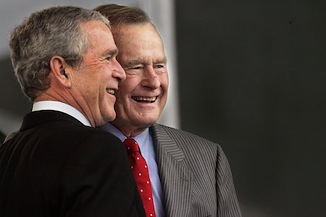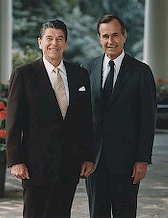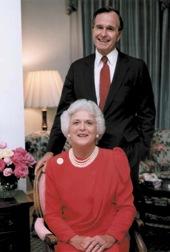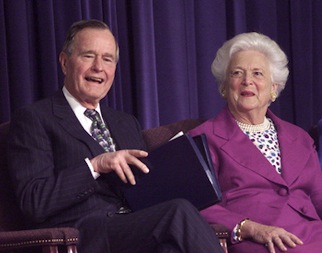That's my boy: Son's troubled presidency burnishes his father's
05/05/08 04:48 PM


By ED BARK
It can't be of much comfort to him, but it almost goes without saying.
What George H.W. Bush didn't do in Iraq can't help but compare favorably with what his son, George W., is doing now.
The latest in PBS' well-received The Presidents series doesn't have to do much at all to compare and contrast. The senior president Bush's former secretary of state, James A. Baker III, notes in retrospect that he used to always get asked, "Why didn't you guys take care of Saddam Hussein when you had a chance?"
"Well, guess what?" he continues with some relish. "Nobody asks me that question anymore."
Premiering Monday, May 5th at 8 p.m. (central) and concluding at the same time Tuesday, the three-and-a-half-hour George H.W. Bush doesn't exactly gild his one-term presidency. It is in large part rehabilitative, though, with critics far outnumbered by admirers, including Barbara Bush, their son, Jeb, and their only daughter, Doro Bush Koch in new interviews for this film. Occasionally seen, but only fleetingly heard in archival footage, is the sitting president Bush.
The Presidents , presented under the long-running American Experience series umbrella, previously has looked in-depth at the formative years and administrations of Franklin Delano Roosevelt, Harry S Truman, Lyndon Baines Johnson, Richard Nixon, Jimmy Carter and Ronald Reagan.
Multi-part American Experience films on John F. Kennedy and Theodore Roosevelt also are part of the series' history. But unlike the aforementioned biographies, they're not scheduled to be re-deployed on PBS as part of a "multimedia election-year project."
George H.W. Bush, written and directed by Austin Hoyt, begins on a heroic note with the now oft-told story of the young Navy pilot being shot down and then rescued after a World War II bombing run. His mission indeed was accomplished before his plane became inoperative. The young Bush's two crewmen didn't survive, though, and he understandably has been reluctant over the years to revisit that traumatic day.


George already had met Barbara as a teenager before he shipped overseas.
"Well, he was the handsomest living human I ever saw," she says, "and maybe the nicest . . . I fell in love at first sight -- practically."
Bush is portrayed as both a politician of expediency and of principle. In his early years as one of Texas' bare handful of Republicans, he reached out to bigoted John Birchers in hopes of forming a bigger tent. An old friend eerily calls him "a uniter."
But once elected to Congress from a Houston district, Bush quickly risked his seat by backing President Johnson's open housing bill.
"Dad got a lot of death threats," remembers daughter Doro. But the film says he bravely took on his detractors at a public meeting in which many of them came away admiring his courage.
Bush eventually lost a run for the U.S. Senate to Democrat Lloyd Bentsen, prompting him to successively accept appointments as the U.S. ambassador to the United Nations, chairman of the Republican National Committee, U.S. ambassador to China and head of the Central Intelligence Agency.
He collected various political IOUs along the way, repeatedly expressing his willingness to serve at the call of the President because to do otherwise would be unpatriotic. It culminated in his successful vice presidential runs with Reagan on the 1980 and '84 Republican ticket.
"In many ways George Bush was what Ronald Reagan pretended to be," says narrator David Ogden Stiers, the former M*A*S*H co-star. That's because Bush in fact was both a war hero and star athlete while the bossman only played them on film. Bush also had a happy, fulfilling family life; Reagan preached family values but had recurring problems with his children, as did wife, Nancy.
Monday's Part One skimps on Bush's controversial 1988 campaign for the presidency, in which he defeated Michael Dukakis after portraying him as soft on crime. His televised, "Iran/Contra affair" dust-up with CBS Evening News anchor Dan Rather is omitted completely. As are his debates with Dukakis or his earlier 1984 struggles in dealing with Geraldine Ferraro, the first woman ever to run on a major party presidential ticket.
Through it all, historians and biographers say Bush went for the jugular only as a last resort. Still, he also seemed all too malleable, leading to George Will's famous "The Sound of a Lapdog" column and Newsweek magazine's characterization of him as a "wimp."
Tuesday's Part 2 details President Bush's key role in ending the Cold War after Reagan "did all the exciting, glitzy stuff," in the view of Colin Powell. The senior Bush also rode his decisive handling of Saddam Hussein's invasion of Kuwait to a then record approval rating of 89 percent.
But a souring economy and Bush's "Read My Lips, No New Taxes" pledge at the 1992 Republican National Convention would quickly undermine his bid for a second term. Says biographer Timothy Naftali, "He never connected with the American people . . . George Bush was not his own best friend when he tried to explain George Bush."
His defeat at the hands of Bill Clinton, with help from cantankerous third-party candidate Ross Perot, left Bush dazed and depressed for a while. But the pain eased, and "I now think we were saved the four most miserable years of our life," Barbara Bush says.
The film ends sentimentally after several Bush admirers stand tall for him and extoll his administration as far more successful than sometimes meets the eye.
George and Barbara Bush continue to divide their time between Houston and their beloved Kennebunkport, Maine retreat. In an excerpt from a recent letter to his children, he tells them, "Your mother and I sit out here like a couple of really old poops, but we're at total peace."
Others no doubt will judge him more harshly. But The Presidents, as have previous films in the series, remains unashamed to hold both the office and its occupants in generally higher stead.
Grade: B
